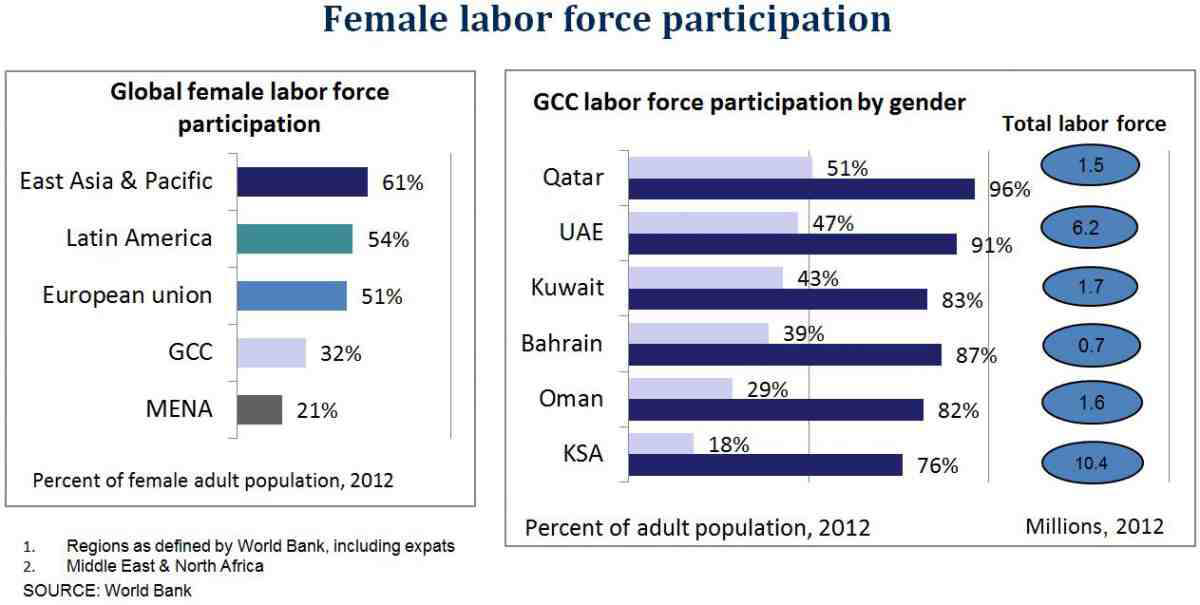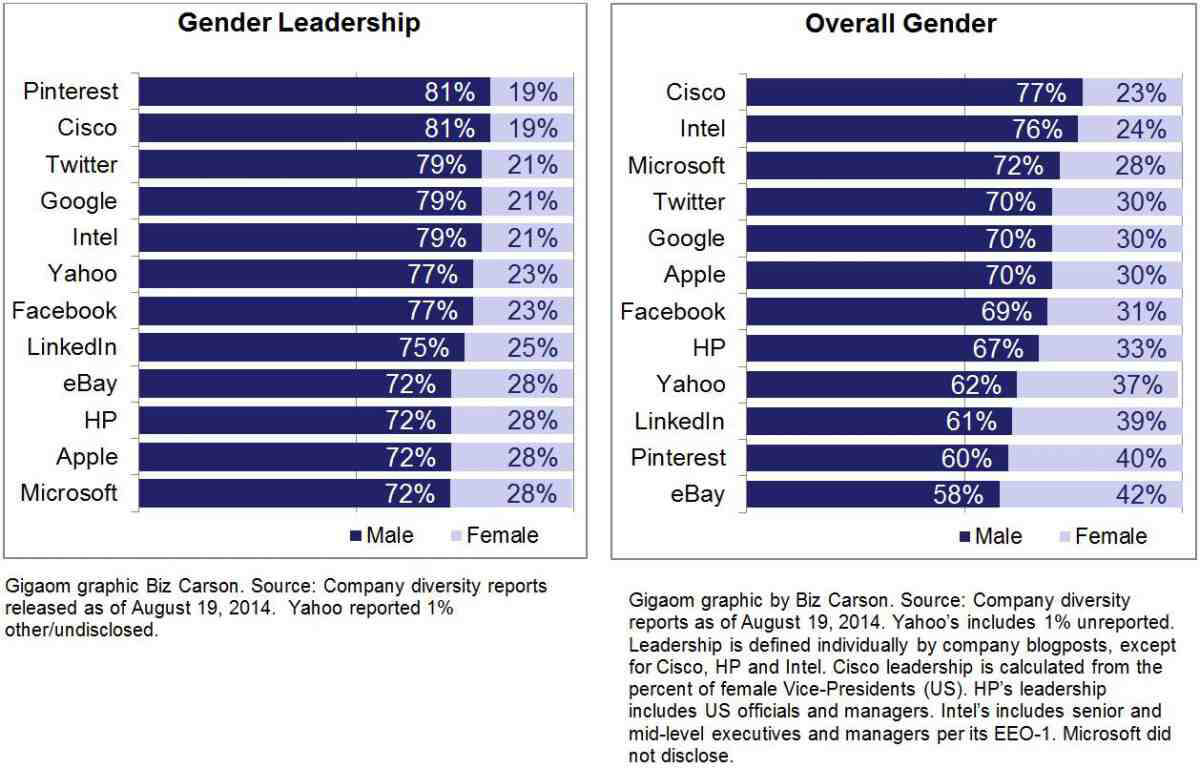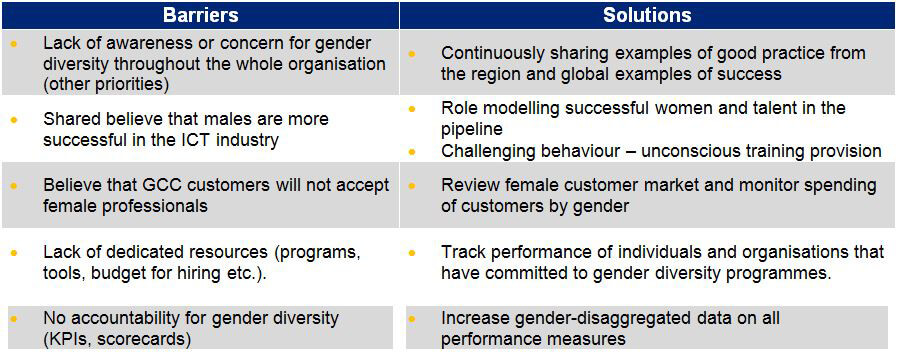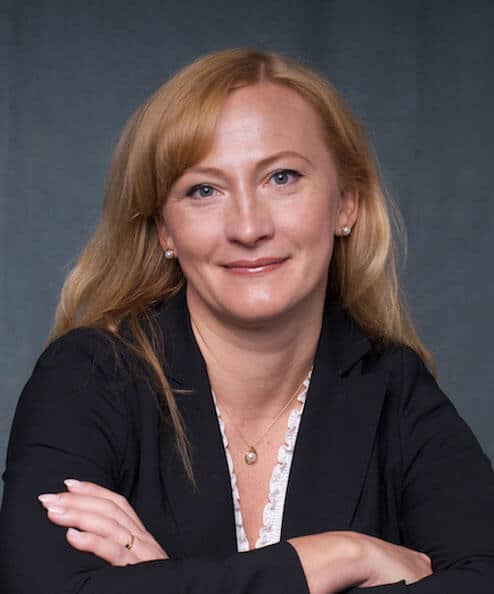Women in the Gulf ICT industry - leading regional practices
April 20th 2015, Dubai, UAE - The Gulf countries are gradually transitioning from oil-based economies to services and knowledge-based economies. Within this transition, it is becoming critically important to leverage the availability of the existing foreign human capital pool (expatriates), and at the same time diversify risk by accelerating investment in higher education institutions, start-ups and IT innovations – creating a skilled talent pool to address the anticipated economy growth.
The ICT industry is a heavily knowledge-based sector, and its growth potential is strongly driven by the availability of smart, ambitious men and women who are the critical success factor for all high-tech companies. According to Gartner, Middle East IT spending amounted to US$211 billion in 2014 and is projected to total US$243 billion by 2018, which will represent 5.6 percent of worldwide IT spending. We are already seeing a considerable shortage of the skilled professionals required for sustainable ICT industry growth in the Gulf Cooperation Council (GCC) states (United Arab Emirates, Saudi Arabia, Qatar, Bahrain, Kuwait and Oman) and the situation will deteriorate further unless concrete actions are taken to address the growing challenge.

Our article addresses gender diversity in the corporate environment, as increasing female participation in the ICT workforce represents one possible solution for closing the GCC talent gap. Our agenda outlines the current gender diversity situation in GCC cross-industries and the worldwide ICT sector, together with the estimated gender diversity ratio in the GCC ICT industry, and concludes by discussing leading practices from reputable regional and multinational ICT companies such as Atos, Ericsson, Juniper Networks and STC (Saudi Telecom Company). The article is based on our research supported by in-depth ICT industry insights (from over 45 executive placements in the last 24 months) and was further analysed during comprehensive interviews with industry stakeholders – specifically, Regional Business Leaders and Human Resource Partners of leading ICT companies operating in the GCC.
Increasing evidence presents a strong business case for women in leadership; gender diversity on boards and senior leadership is correlated with superior business performance, improved ROI and higher share prices.
Although the majority of industry stakeholders acknowledge the importance of increasing female representation in the organisations as a practical way to close the talent gap and build sustainable high-performing teams, there is no standardised industry-wide approach to address this opportunity. Nevertheless, in this article we highlight the stand-alone leading practices that we found. By consolidating or standardising our efforts to offer interesting and meaningful employment to more GCC women, we can close the gap in the professional workforce faster while creating a richer and more competitive industry.
Organisations provide the key to improving gender participation at all levels. This requires industry leaders who are committed to drive improvements in gender diversity and region wide promotion of female role models. Improving corporate practices in gender diversity would inspire and encourage more talented GCC women to consider a career in the ICT industry.
“Our job is to provide an environment that unlocks women’s potential – one that protects their dignity and femininity, helps them create the necessary balance in their lives, and values their talents and potential. Given this environment, I am confident that women will perform nothing short of miracles,” said Mohammed bin Rashid Al Maktoum, Vice President and Prime Minister of the United Arab Emirates (UAE), and constitutional monarch of Dubai.
Women in the GCC
It is extremely difficult to point out a single reason for the unique status of women in Gulf societies. Instead, we see a combination of political, economic, religious and cultural establishments and values – from a historic absence of women in the political and economic arenas, through religious boundaries and interpretations, to the promotion of patriarchal agendas. Globally there is a great deal of progress for women in leadership, however in the Gulf there seems to be disparity between the presence of women in the workforce and achievements of female students.
According to a World Bank report, Gulf female participation in the workforce is 11% higher than the Middle East average, mainly due to the number of female expat workers, especially in UAE and Qatar. However, the Gulf still lags behind more developed and mature markets (32% vs. 51% in the EU) despite on-going efforts by GCC officials and governments to support female participation in the workforce. Saudi Arabia has the lowest female workforce participation among the Gulf countries, mainly due to the fact that mixed-gender work environments are not permitted there. This adds a cost barrier to employing women, as companies need to invest in double facilities (or alternatively open operation centres that are 100% female-staffed, such as STC's leading practice which we will discuss later). Moreover, women are forbidden to drive in Saudi Arabia, which is especially limiting for front-end roles with market engagement requirements (sales, partner management, etc.). However, the longer-term benefits of creating a diverse workforce can potentially outweigh the initial set up costs.
As with other conservative and traditional societies, cultural norms in the Gulf are gradually transforming and evolving due to increases in education, new opportunities and demographic shifts.
Table 1: Labour force participation rate, female (% of female population ages 15+) by GCC country
How does this affect the ICT industry?
ICT is still characterised by a lower representation of women worldwide and by a drastic decrease of the number of women at senior and executive levels. Although attempts have been made for decades by top industry names, the situation does not look exceedingly promising. According to recently published worldwide data by IT multinational power-houses (see Table 2: Company diversity reports), only 19-28% of leadership roles and 23-42% of roles across all functions are held by women.
We can use these statistical snapshots (Table 1: Female participation ratio in GCC workforce and Table 2: IT Company diversity reports, worldwide) to estimate the situation regarding female participation in the GCC ICT industry. The figures in Tables 1 and 2 demonstrate a very steep drop off rate for women; the GCC ratio is at least twice as low as the global industry average. These figures are a cause for concern but also provide immense opportunity for companies to work on practices to retain and promote female talent as well as provide capacity building to unlock female potential and close this gap. Our theoretical estimate has been strongly validated by industry stakeholders and the insights of the executive search industry: 90% of candidates are male and we have only interviewed a small number of qualified women (mainly expatriates).
Table 2: Company Diversity Reports of August 19, 2014
Table 3: GCC female labour force estimation in ICT
Leading Regional Practices - Gender Diversity
The majority of multinational companies and leading regional players consider gender diversity to be an increasingly important factor for sustainable business operations and a competitive workforce, while at the same time closing the regional talent gap. The baseline approach is a sensible implementation of the global Gender Diversity agenda (hiring and succession planning, work/life balance initiatives for families, mentoring programs) but we also came across some region-specific projects fostering female participation in the ICT industry, specifically in the Telecom sector, where mobile operators are owned by governments and family groups. Gender-disaggregated data is essential to measure progress and identify stress points in companies.
In this section, we would like to highlight a selection of Leading Practices outlining company-wide efforts to drive Gender Diversity in the regional organisations:
Atos – Leading Practice “Hiring Female staff in the Middle East”
Atos SE (Societas Europaea) is a digital services leader with 2013 pro forma annual revenue of € 10 billion and 86,000 employees in 66 countries.
In early 2012, just a few months after the acquisition of Siemens SIS, Atos decided to focus efforts on employing female professionals within its Middle East organisation for the following reasons:
- Gender diversity will foster more rounded teams and departments – while diverse personalities and nationalities were already present, gender diversity was missing
- More senior female staff to balance the all-male management team
- A demand for female client-facing staff (direct feedback from their clients)
- Internal mobility of female staff across Atos
Maria Manzoor, Human Resources Director Middle East, told us: “Within this initiative, Atos hired 14 women over the past two years – mostly for senior level positions – with an excellent success rate. Eighty percent of female employees have been promoted during their tenure, and Atos has won client confidence by listening to the clients' needs and demands. The company's internal teams are now more balanced and diverse, which has enabled a more holistic team dynamic.”
Ericsson – Leading Practice “Diversity Council in RMEA”
Ericsson is the world’s leading provider of technology and services to telecom operators. Ericsson employs over 10,000 professionals, and has customers in 180 countries, with more than 2 billion users globally and 40% of all mobile calls being made through their systems networks.
Following the global model, Ericsson Region Middle East & East Africa (RMEA) inaugurated a regional Diversity Council last year, the first meeting of which took place in September. The Council comprises a sponsor, a council lead and 12 members representing all units and functions. The sponsor also represents the region at the Global Diversity council, to ensure full alignment and coordination. The RMEA Diversity Council’s primary responsibilities are:
- Setting and monitoring the Diversity & Inclusion (D&I) strategy
- Overseeing the implementation of Ericsson's D&I strategies, policies, initiatives and actions both internally and externally
- Organising diversity events by incorporating feedback loops
- Monitoring and auditing progress on D&I strategies, policies, initiatives and actions as applicable
- Championing D&I activities and events internally and externally
- Meeting quarterly to assess initiatives, prioritise actions and track progress
- Reporting progress to the Head of the Region and the Region Leadership Team (RLT)
- Quarterly meetings with Line Managers to spread awareness about diversity
The Council holds bi-weekly calls to discuss current activities, assign responsibilities, follows up on actions and engagements. This ensures continuous momentum and rigorous execution on Ericsson's D&I plans. Overall the Council has proven to be a successful mechanism to really drive Ericsson's Diversity & Inclusion agenda forward.
Juniper Networks – Leading Practice “Unlocking the potential of female talent in Saudi Arabia”
Juniper Networks [NYSE: JNPR] is headquartered in Sunnyvale, California, with over 9,000 employees in 70 countries and nearly US$5 billion in revenue.
“In Saudi Arabia we started to consciously focus on female talent for all internal focused positions”, stated Bregje Meuwissen, HR Business Leader Emerging Markets and CSS. “We found that there is a considerable female talent pool across a variety of profiles in Saudi Arabia, and we have been able to hire some absolute Top Talents into the organisation by shifting our focus from male Saudi talent. The requirements for transitioning from an all-male office to a mixed office were a lot less complex and costly than we originally thought, and the ability to hire women has really paid off,” adds Meuwissen.
Saudi Telecom Company (STC): Leading Practice: “100% female staff at IT Service Centre”
STC is the leading national provider of telecommunication services in the Kingdom of Saudi Arabia with an established presence in Kuwait, India, Indonesia, Malaysia, Turkey, South Africa and Bahrain. Over USD$12 billion revenue was reported in 2014.
Amjad Shacker, GM Corporate Communication at Saudi Telecom Company explains the context which led to the inauguration of an all-female IT Service Center: “Each society has its own characteristics and norms. In the KSA, there are very limited opportunities for professional women, despite the fact that more and more Saudi women are attaining university degrees. The Saudi government keeps encouraging the private sector to recruit more Saudi women, and STC as a leading company within the private sector has decided to contribute to these efforts. STC is therefore reflecting its commitment to boosting workplace diversity and creating opportunities for working Saudi women in the Kingdom by opening an IT Service Center with a fully-female workforce in partnership with its IT partner Tata Consulting Services (TCS).”
The collaboration has been successful, Shacker continues: “STC's CEO and executive management are committed to any initiative which will develop Saudi local talent and resources in the local market, and support and empower Saudi women to work within any environment which aligns with the religion and traditions of the Kingdom. This initiative was driven end-to-end by STC top management Dr. Khalid Al-Biyari, Senior Vice-President of Technology and Operations and the entire STC IT department.”
STC now plans to expand the opportunities offered to Saudi women to other corporate initiatives.
This was an expedited project - STC began to discuss this initiative with TCS at the beginning of June 2014, the contract with TCS was officially signed at Gitex in October 2014 and the Women IT Service Centre opened on November 30th 2014.
The recruitment process had some major players involved: STC signed an agreement with TCS, a multinational IT service provider, to execute the establishment and management of the centre. As an initial step, TCS carried out all the interviews to hire 30 talented women who underwent world-class training facilitated by TCS. STC adopted another initiative in November 20014, launching the first female call centre to serve female customers. The centre was made possible by cooperation with Contact Center Company (CCC), a subsidiary of the STC Group.
The company had to define a recruitment strategy as well, Shacker continues. “Our recruitment strategy was to initially hire 30 fresh female Saudi graduates from local universities, who would undergo world-class training facilitated by TCS, under female technical expert supervision and management from TCS. Afterwards, female employees would be assigned to IT projects managed by Tata Consultancy Services at STC in an environment that adheres to our noble Islamic principles. This supports the strategy of the government, which aims to create employment opportunities for women.”
As this was an innovative project, there were several key challenges that STC predicted and planned for in advance: “Various regional government policies needed to be adhered to before we could start up the service centre. As this is a new focus area, attrition could have been a concern; knowledge management and transfer are therefore key challenges in running these operations – for which we already have our contingency and mitigation plans in place,” clarified Shacker.
This initiative has generated positive reactions on the market and within the customer base: “The Saudi market has supported this initiative and reacted positively towards the recruitment of Saudi women in this IT development area, which has had a very limited focus from major companies in Saudi Arabia. We are proud to pioneer this initiative,” Amjad Shacker concluded.
Conclusion
All of the interviewed industry stakeholders admitted that gender diversity is an important or increasingly important topic within their organisation. A majority stated that there is increasing Top Management support for and engagement in driving gender diversity across the whole organisation. On average, the stakeholders reported 5-19% female participation, with one-half or one-third as much representation in the leadership teams. Industry stakeholders also added that 1) successful role models and 2) mentors and sponsors are two “big bets” for increasing female participation in the ICT workforce.
As per Jumana Abu-Hannoud, Founding Partner at Reach (www.reachmentoring.org – a non-profit organisation focused on unlocking the potential of the regional female talent pool): “Mentoring is self-reflection; it allows individuals to question their objectives in life, both personal and professional, and then set a plan to achieve results. Particularly in male-dominated sectors, women can greatly benefit from the advice of both male and female mentors. The sharing of experiences and insights encourages women to connect and exposes them to new approaches for overcoming professional challenges, and developing the confidence to achieve greater success and personal satisfaction.”
“We see championing women as a part of advocating, supporting and promoting genuine human talent. It is about helping talented individuals to spot opportunities, it is about encouraging their confidence and identifying how to build their capacity to handle these roles, it is about finding the best person for the job. Championing provides a win-win for both parties and the benefits are broader than pure transactional exchange,” said Dr Shaheena Janjuha-Jivraj, co-founder of Boardwalk Leadership and Associate Professor, Henley Business School.
Among the top initiatives driving the gender diversity agenda in GCC organisations, we would like to highlight the following:
- Integrated gender diversity plan across the whole organisation
- Flexible working conditions and locations
- Programs helping to balance work and family life
- Programs to encourage female networking - role models
- Gender diversity KPI as part of the business scorecard
- Senior executives mentoring junior female hires
- Skill building programs specifically for women
- Programs helping transition to and parental leave
- Planned initiatives to support hiring, promoting, retaining and developing women
- Internal and external role models
At the same time, the following aspects were mentioned as the biggest barriers in implementing gender diversity agenda in GCC organisations:

Many respondents mentioned that there is no one leading role or function where women are the best-performing employees, which rather confirms the fact that top performance comes from talented individuals and is not gender-specific. Individual women performed well in sales, business operations, administrative and technical roles (both in management and as individual contributors).
Sources & Stakeholders Interviewed
- Jumana Abu-Hannoud, Founding Partner at Reach Non-Profit Incorporated Organisation
- Susanne Bjerre Mortensen, HR Lead Middle East at Accenture
- Dr Shaheena Janjuha-Jivraj, co-founder of Boardwalk Leadership and Associate Professor, Henley Business School
- Fida Kibbi, Vice President & Head of Communications at Ericsson Region MEA
- Maria Manzoor, Human Resources Director Middle East at Atos
- Bregje Meuwissen, HR Business Leader Emerging Markets and CSS at Juniper Networks
- Amjad Shacker, GM Corporate Communication at Saudi Telecom Company
- Unlocking women's potential to enhance organizational effectiveness in the Gulf Cooperation Council (GCC) states
- Gender Equity in the Middle East and North Africa: Integrating Men and Boys
- Gender Equality and Development in the Middle East and North Africa
 Daiga Trumpe is a Client Partner and Head of the Technology Practice MEA at Pedersen & Partners. Ms. Trumpe joined Pedersen & Partners in 2010 and in 2012 moved to Dubai to establish the Technology Practice business in MEA. Ms. Trumpe has over 20 years’ of experience in commercial leadership roles in ICT sector summing up her assignments for Telia Sonera group, mobile operator Tele2 and an 11 years journey with Microsoft Corporation spanning from start up operations up to the Country Manager role. Since joining Pedersen & Partners, Ms. Trumpe has had significant success in applying her in-depth IT & Telecom industry experience to provide outstanding advice to her international and regional clients, attracting strong leaders to support their business needs. She is an active speaker at professional and specialised conferences and seminars, and has an established reputation as an expert in strategic business consultancy. Ms. Trumpe has in depth awareness of emerging market dynamics and talent pool specifics from executive placements across CEE / Russia & CIS / Middle East & Africa.
Daiga Trumpe is a Client Partner and Head of the Technology Practice MEA at Pedersen & Partners. Ms. Trumpe joined Pedersen & Partners in 2010 and in 2012 moved to Dubai to establish the Technology Practice business in MEA. Ms. Trumpe has over 20 years’ of experience in commercial leadership roles in ICT sector summing up her assignments for Telia Sonera group, mobile operator Tele2 and an 11 years journey with Microsoft Corporation spanning from start up operations up to the Country Manager role. Since joining Pedersen & Partners, Ms. Trumpe has had significant success in applying her in-depth IT & Telecom industry experience to provide outstanding advice to her international and regional clients, attracting strong leaders to support their business needs. She is an active speaker at professional and specialised conferences and seminars, and has an established reputation as an expert in strategic business consultancy. Ms. Trumpe has in depth awareness of emerging market dynamics and talent pool specifics from executive placements across CEE / Russia & CIS / Middle East & Africa.
Ms. Trumpe holds a Master's Degree in Economics and International Business from State University of Latvia and has been nominated for EMEA High-Potential program @ Microsoft enabling to complete Microsoft EMBA. In addition to her native Latvian, she is fluent in English and Russian.
Pedersen & Partners is a leading Executive Search firm, operating 53 wholly owned offices in 50 countries: 32 in Europe and CIS, 7 in the Middle East and Africa, 6 in the Americas and 8 in Asia. Our values Trust - Relationship - Professionalism apply to our interaction with clients as well as executives. More information about Pedersen & Partners is available at www.pedersenandpartners.com
If you wish to conduct an interview with a representative of Pedersen & Partners or have other media-related requests, please contact: Diana Danu, Marketing & Communications Manager: diana.danu@pedersenandpartners.com
